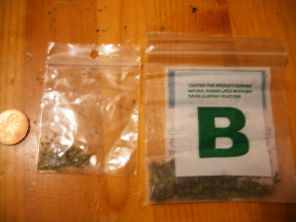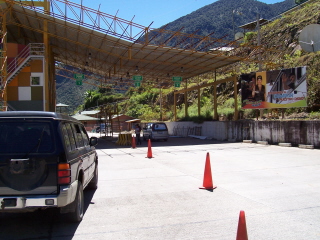Did an Arizona school administrator go too far in subjecting a 13-year-old girl to a strip search in a quest to track down alleged contraband Ibuprofen? The US Supreme Court heard oral arguments in a case that asks just that Tuesday.
From sea to shining sea, America's cannabis nation celebrated its rhizomatic annual 4/20 holiday again this week. Much weed was smoked and a good time was had by all. But should we really be celebrating?
With an economic crisis requiring sensible budget cuts, a Constitution-friendly administration and more people joining the drug policy reform movement than ever before, StoptheDrugWar.org has a unique opportunity to make our case.
More crooked prison guards, more crooked cops, and -- in a first for this newsletter -- a crooked Fish and Wildlife officer.
The cops can't search your car after they arrest you unless they have a warrant or probable cause, the Supreme Court has ruled.
Prosecutors in one California county have called a halt to small time drug prosecutions. They just can't afford them, they said.
A medical marijuana bill in New Hampshire is one Senate floor vote away from passage after it was approved by a Senate committee Thursday. The state House has already passed it.
Voters in Maine will have a chance to approve a medical marijuana bill that provides for dispensaries, among other things, this November. The legislature had its chance, but punted.
The nation's first salvia possession case has ended not with a bang, but a whimper. At least no one is going to jail.
Mexican and Colombian drug traffickers are hiring middle men to process coca paste into refined cocaine in Bolivia.
By refusing to hear a government appeal of two lower court decisions, Canada's Supreme Court has ended the government monopoly on the medical marijuana supply and opened the way for multi-patient grows.
Events and quotes of note from this week's drug policy events of years past.
"Sentencing Postponed in the Charlie Lynch Trial," "Opposing Medical Marijuana is Politically Risky," "Poking Around in a Teenager's Panties is a Sick Crime (Unless It's a Drug Search)," "Wow, These 4/20 Celebrations Are Surprisingly Safe," "If You Think the Drug War Protects Young People, Read This," "Obama's Fraudulent Pledge to Respect Medical Marijuana Laws," "Supreme Court Restricts Warrantless Vehicle Searches," "The Mainstream Media Wishes You a Happy 4/20," "Baptist Pastor Assaulted After Refusing Police Search."
Common Sense for Drug Policy is seeking an editorially-skilled individual to maintain and grow its network of web sites, including the in-depth online presentation on drug policy issues, DrugWarFacts.org.
The Drug Policy Alliance is seeking a Publications Manager to work from its New York City office.
The movement's longest-running grant program is continuing this year and is seeking proposals.
Apply for an internship at DRCNet and you could spend a semester fighting the good fight!
The US Supreme Court heard oral arguments Tuesday in Safford Unified School District #1 v. Redding, a case that originated in a school administrator's decision to subject then 13-year-old Savannah Redding to a strip search after another student said she had obtained prescription-strength Ibuprofen tablets from her.

US Supreme Court
The case began when administrators in Safford, Arizona, received a tip from a student and his parents that another child possessed the tablets and planned to give them to other students at lunch. Authorities confronted the second student and found Ibuprofen tablets in her possession. The second student told administrators she had obtained the pills from Redding.
Redding was escorted to the principal's office, and Redding's backpack and outer clothes were searched, but no pills were found. She was then told to remove her outer clothing in front of the school nurse and an administrative assistant, both female. Standing in her underwear, she was ordered to pull out her bra and underwear to allow any hidden pills to fall free. None did.
Redding and her parents then sued the school district for violating her constitutional right to be free of unreasonable searches and seizures. Redding won in the 9th US Circuit Court of Appeals, and the school district appealed to the Supreme Court.
The justices' questions during oral arguments Tuesday suggested that, as they sought to find a balance between student privacy and public school safety, they were tilting toward the latter. They appeared inclined to give school administrators broad authority to do what is necessary to protect kids from drugs.
That's what attorneys for the school district argued. "Searching any place where she might be reasonably hiding that contraband was constitutionally permissible" because the school district was acting as guardian, not law enforcement, said Matthew Wright, counsel for the district. "It's not like a criminal issue where they're trying to prosecute. This is a case where they're trying to protect," Wright said. "It is best for this Court to defer to their judgment... and not second-guess those rules."
Justice David Souter, noting that the drug at issue was Ibuprofen, interjected that, "At some point, this gets silly."
Still, Souter also remarked that it could have been a more dangerous drug, and the consequences of not acting could be tragic: "My thought process is, I would rather have the kid embarrassed by a strip search, if we can't find anything short of that, than to have some other kids dead because the stuff is distributed at lunchtime and things go awry."
Justice Antonin Scalia pressed Wright about whether a body cavity search would be permissible. While Wright tried to dance around that question, saying body cavity searches were not done because school officials were not trained to do them, Scalia kept pressing. In the end, Wright conceded that "I could see that result."
Despite concerns about how far school administrators could go in searching for drugs, the justices seemed even more concerned about more dangerous drugs. The justices repeatedly asked hypothetical questions about what if it had been heroin or methamphetamine instead of Ibuprofen.
When it came time for Redding's side of the case to be argued, a Justice Department attorney took the lead. "We believe that without some particularized suspicion or some specific indication that this, the location, was a likely one to contain the drugs, that this search was excessively intrusive," said attorney David O'Neil. "And this is not a new standard."
"We agree with the federal government that before conducting an intrusive strip search a school needs to have location-specific information," argued Adam Wolf of the ACLU Drug Law Reform Project. "And while this case can begin and end with that well-accepted proposition, it's also important to recognize that a school needs greater -- a greater degree of suspicion to conduct a strip search than to conduct an ordinary backpack search. This search violated the clearly established point that in order to conduct an intrusive search of one's body, the searching official needs to at least reasonably believe that the object is located underneath the undergarments. The Fourth Amendment does not account -- it does not countenance the rummaging on or around a 13-year-old girl's naked body."
Justice Stephen Breyer tried to get Wolf to elaborate on "how bad" such searches really were, noting that students often changed clothes at school for gym class, but that only inspired Justice Ruth Bader Ginsburg, the only woman on the court, to intervene. "It wasn't just that they were stripped to their underwear," she said incredulously, referring to Redding and another girl similarly searched at the school. "They were asked to shake their bra out, to stretch the top of their pants and shake that out."
While the justices were weighing constitutional rights and student safety, youth rights advocates had little trouble sorting out the issues. "Strip searching eighth graders is way over the line," said Amber Langston, eastern region outreach director for Students for Sensible Drug Policy (SSDP). "This kind of thing is a horrid example of the failure of our drug search policies in public schools. They said they were trying to protect the children, but who was protecting Savannah Redding from the humiliation inflicted on her by school officials?"
Students deserve the same constitutional rights as anyone else, said youth sociologist and Youth Facts founder Michael Males. And school districts should be making better choices, he added.
"Students should only be detained or searched under the same rules applied to adults," Males said. "If authorities have probable cause to suspect illegal behavior that would satisfy standards of reasonable suspicion, they can detain and search suspects. School strip searches require a very high level of probable cause, yet they typically seem based on gossip."
Males called the Redding case "particularly bizarre," noting that it only involved Ibuprofen. "School officials didn't seem interested in searching lockers, desks, or anywhere except inside the girl's underwear," he noted. "These kinds of traumatic cases are, again, why I keep arguing against raising hysteria about teenage drug use."
"Adults inspecting children's private parts is something we should be very wary of," said SSDP's Langston. "This was all over prescription-strength Ibuprofen, there was no evidence Savannah even had it except for the word of another student who was in trouble herself. If the Supreme Court allows this to stand, we will have given too much power to school officials to conduct such searches."
It's not just students but the school districts themselves that suffer from overbroad search policies, Males said. "These types of school searches have wound up costing hundreds of thousands or millions of dollars in legal costs and, to my knowledge, virtually never find anything, which raises questions of why administrators are allocating scarce education resources to them."
The Supreme Court will decide the case later this summer. All indications are it will reverse the appeals court and uphold this expansion of school administrators' authority to do "whatever it takes" to protect students from drugs.
back to top
Over the past three decades, 4/20 has crept -- and then leapt -- into the public consciousness as the unofficial National Marijuana Day. While the origins and significance of 4/20 as a marijuana holiday are the subject of contention, the most commonly accepted version is the one enunciated by High Times editor Steve Hager. (See explanatory YouTube video here.) Hager explains that 4/20 began in 1971 as the code for a small group of San Rafael High School pot smokers who would gather after school at 4:20 to indulge in their vice.

student activist flyering during 2007 4/20 rally in Toledo, Ohio
Since then, 4/20 has mushroomed, embraced by countless marijuana enthusiasts as their special time of day, or, in the case of April 20, day of the year. What began as private celebrations of stoner togetherness have now morphed into sometimes massive public events hailing the herb, not to mention a whole industry of 4/20 paraphernalia makers and sellers. This year, as the topic of marijuana and marijuana law reform grows white hot (look for an article on that here next week), 4/20 celebrations garnered increased attendance and increased media attention. This year's 4/20 was probably the most recognized yet, with thousands of people gathering at places like the University of Colorado in Boulder and the University of California at Santa Cruz to celebrate the weed and to express that celebration by publicly toking up in massive numbers.
But it wasn't just Boulder and Santa Cruz. 4/20 events took place across the land, with several thousand people gathering in Denver and another large crowd in San Francisco. In New York City, High Times threw in a party. In Oakland, medical marijuana advocates used the occasion to conduct a fundraiser. In Memphis, hundreds participated. In Saratoga Springs, New York, about 100 Skidmore College students celebrated. Similar accounts can be heard from campuses and communities across the land.
"It's a time for us to celebrate our pastime, I guess you could call it, or adult substance of choice," Richard Lee, president of Oaksterdam University, an Oakland trade school for cannabis club workers told the Associated Press. "It's like St. Patrick's Day is for drinkers."
It wasn't just pot heads acknowledging 4/20. The cable TV network G4 ran marijuana-friendly programming all day. The cable TV network Showtime used 4/20 to send out a mass email promoting its hit series "Weeds." 4/20 seems to have come into its own.
But while 4/20 is proving wildly popular with Cannabis Nation and enterprising entrepreneurs, it is not without its critics, and some of the themes they hit will be familiar to anyone who has followed movement debates about strategy and tactics. Does the spectacle of mass drug-taking and law-breaking help the movement? Malakkar Vorhyzek doesn't think so.
Vohryzek, the New York office coordinator for the Drug Policy Alliance, attacked the 4/20 celebrations in a same day blog post, In Opposition of 4/20 on 4/20. "How does it look, this annual celebration? Juvenile. Like our opponents to sensible drug policy have more sense than us. They celebrate their victories in real terms with a frame that makes it look like they're actually accomplishing something (when in fact, prohibition has failed by all measures). Their markers lead to more funding, more acceptance in political circles, more acceptance as an appropriate way to handle drugs in our society. The 4/20 celebrations, on the other hand, look imbecilic. Despite the miserable failure to radically alter the drug policy landscape, despite the hundreds of thousands of ruined lives from cannabis prohibition, these celebrations make those who appreciate or need cannabis look like people who are just happy to party," he continued.
While Vohryzek took pains to make it clear he supported ending drug prohibition, until the cannabis prisoners are freed, he said, "4/20 partying can go to hell." Instead of celebrating, Cannabis Nation should spend 4/20 "protesting the senseless policy of cannabis prohibition -- demanding amnesty, clemency and/or pardon to all cannabis 'offenders.' Once we achieve something like that, then celebrate."
"The 4/20 celebrations feed into a stoner stereotype that actually hurts us," said Vohryzek Wednesday, pointing to the inevitable front-page newspaper photos of very young people smoking pot in public. "Even when I was in the middle of my drug career, I didn't publicly celebrate it," said Vohryzek, whose drug career ended after he was sent to prison on LSD charges.
As a former drug war prisoner, said Vorhyzek, "I find it offensive that people are so set on celebration without paying any attention to all those people behind bars. I'm offended that people are celebrating while prohibition is still in place. What do you think people in prison or treatment think watching these events? We need to combine these 4/20 events with protests to say we won't celebrate while there are still people in jail."
Vohryzek also criticized the 4/20 events as "privileged" and "sending the wrong message." "We shouldn't be encouraging drug use of any kind," he said. "You don't have national meth snorting day. There is also a racial dynamic. Smoking marijuana is protected by privilege, whether it's skin color or a certain amount of money in the bank, so there is a sort of discriminatory aspect to it. You don't have 4/20 in the hood because the cops would be cracking down. 4/20 happens in white suburbs or college campuses, where privilege protects the participants," he said.
Bruce Mirken is communications director for the besuited Marijuana Policy Project. "We don't do 4/20 parties because we think there is a lot of value in letting people see the non-stereotypical side of our movement," he said. "I still have to handle way too many pot and stoner jokes."
Still, said Mirken, there is room in the big tent for everybody. "We are a large and mixed movement, and becoming larger every day as people come out of the closet. That's a healthy thing. I have a long history in other movements where there have been similar debates, and I've always been resistant to trying to censor anybody. I think we should let the world see the multitudes of folks who either use marijuana or think the laws need to be changed, but at the same time, if you're going to a public event, it wouldn't hurt to think about the possibility you'll end up on the evening news. Are you going to show up in a way that helps people understand and advance the issue or not?"
Colorado-based activist Mason Tvert of SAFER said his attitude toward 4/20 events was changing. "I've long held that these things aren't necessarily helpful," he said. "They may be counterproductive in terms of media coverage; in many cases, they send the message that marijuana smokers are irresponsible, that they're openly breaking the law."
But the event in Denver this week and the attention it garnered signals a change, he said. "I've had a shift in my attitude that I think reflects a shift in public attitude," Tvert said. "The headline in the Denver Post was 'Peaceful Pot Party at Civic Center,' and I was quoted about police just standing around with nothing to do. No incidents, no arrests, no injuries. If those cops were at a University of Colorado football game with all the drinking, they'd be in riot gear."
Tvert took issue with Vohryzek's characterization of 4/20 participants as "privileged." "Here in Denver, the majority of people out there were black and Hispanic youth, not upper class white kids at all. That skin privilege argument just wasn't the case at all in Denver."
There is also a certain hypocrisy about getting upset over people using marijuana in public, said Tvert. "This may not be the best image for our cause, but keep in mind there are public drinking events all the time and keep in mind that 4/20 is safer than any alcohol-fueled sporting event or party. We have to highlight the positive, safe, peaceful side of these events. Just compare Hemp Fest with Mardi Gras."
Even if movement leaders in all their wisdom decided that events like 4/20 are bad for the movement, they're not going away, said Tvert. "Here in Denver, people have been gathering to celebrate 4/20 for years. They're going to happen whether SAFER or DPA or MPP likes it or not. Our job is to figure out how to harness that energy. We have hundreds of people signing up to get involved at these events, and that's a good thing."
And that is probably the most sensible approach to the annual celebration of the marijuana subculture. It is a true grassroots phenomenon, percolating up from communities and campuses across the land like so much bubbling bong water, and now it seems to be breaking into the mainstream, too. 4/20 may not be the ideal face for the marijuana law reform movement, but it is the face of many of the people the movement claims to serve.
back to top
Dear friend of drug law reform:
We have an historic opportunity to change drug policy right now because three major events are happening simultaneously.
I'll explain that in a moment, but first I want to ASK for your support at this important time.
Your membership in StoptheDrugWar.org will enable us to reach people in communities all across our nation and the world. I encourage you to join us today as we launch our exciting new 2009 "Changing Minds, Laws & Lives" campaign.
Now... here are the three converging events that have us so optimistic about 2009:
First, the Obama administration is doing a pretty good job of following through on its campaign promises for drug law reform — not perfect, but pretty good. Second, the economic crisis is forcing all government agencies — including correctional systems — to rethink their financial priorities. And third, we keep breaking visitor records at StoptheDrugWar.org. As the world's #1 source for news, information and activism promoting sensible drug law reform, we know that the more visitors we get, the more we're building the anti-prohibition movement.
Your participation at this point in history is very important, and I'd like to send you some free gifts to show our appreciation.
For a contribution of $36, you can choose either of our new StoptheDrugWar.org T-shirts pictured above — "Prohibition Doesn't Work" or "STOP" (click for an enlarged view). For a gift of $60 or more, you get both shirts. And for a contribution of $100 or more, you also get your choice of any single item from the StoptheDrugWar.org inventory.
Your membership today will make an immediate impact by helping StoptheDrugWar.org (DRCNet):
- Produce more internet videos like "SWAT Raids -- No One is Safe" and fund more actions like our upcoming News Rewriting Project.
- Grow the groundswell for change by helping grassroots organizations — our movement's "boots on the ground" — reach out to more people.
- Pressure the Obama Administration to make good on all of its promises and lobby Congress to make smart funding choices by providing the truth about the Drug War.
- Break more records*! With each improvement to our web site, we become an even more powerful resource for anyone (including media and politicians) to find information about the Drug War.
What you and I and our friends are doing together is working. We can't back off now. By taking advantage of the opportunity we have during this pro-reform climate, we can change minds, change laws and, most importantly, change good people's lives.
Thank you very much,

David Borden
Executive Director, StoptheDrugWar.org (DRCNet)
P.S. It's time to stop wasting time, money and good people's lives. Please join us in "Changing Minds, Laws & Lives" by adding your support to StoptheDrugWar.org while we have this unique opportunity. Thank you!
* We set yet another record for online visitors in March — 235,000 — in a long line of record-breaking months these past two years.
back to top
More crooked prison guards, more crooked cops, and in a first for this newsletter, a crooked Fish and Wildlife officer. Let's get to it:
In Baltimore, four current or former Maryland state prison guards were among two dozen people indicted by a federal grand jury April 16 on drug conspiracy and other charges. The guards allegedly worked to provide imprisoned Black Guerrilla Family gang leaders with heroin, ecstasy, tobacco, cell phones, and other contraband. Gang members would sell the drugs inside the prison and use the cell phones to set up drug deals on the outside. Current prison guards Asia Burrus, 22, and Musheerah Habeebullah, 27, were indicted, as was former guard Terry Robe, 26, and former prison kitchen employee, Takevia Smith, 24. Another half dozen guards were also implicated, but have not yet been charged.
In Wellston, Missouri, a former Wellston police officer was indicted April 16 for paying prostitutes for sex and providing them with heroin. Former officer David Dausman, 35, was arrested in January and fired shortly thereafter. He is charged with corruption by a public servant, felony drug delivery, patronizing a prostitute. He also faces federal charges of making and possessing counterfeit currency and forging the seal of a federal agency.
In Rochester, Minnesota, a Rochester police officer was arrested April 15 for providing information about Rochester Narcotics Unit members to people being investigated for drug offenses. Officer Vanessa Nicole Mason, 31, also allegedly was seen using drugs and hanging out with known drug offenders. She now faces charges of public officer misconduct and bribery. She was disciplined in 2006 for failing to report drug use by a fellow officer and warned she would be terminated if there were any new disciplinary issues. Her job security right now appears pretty shaky.
In Stock Island, Florida, two Florida Keys law enforcement officers were arrested last week after being snagged in an undercover sting in which they thought they were transporting drugs for drug dealers. Monroe County Sheriff's Office corrections officer Shawn Hernandez and Florida Fish and Wildlife Conservation Commission officer Jonathan Jacox are in federal custody in Miami charged with possession with the intent to distribute narcotics, conspiracy to traffic in narcotics and possession of a firearm in commission of a felony. Between them, the pair carried what they thought were shipments of heroin or cocaine at least five times as the DEA and a raft of other law enforcement agencies watched.
back to top
A narrowly divided US Supreme Court Tuesday refused to expand police search powers at the expense of privacy rights, ruling that police cannot search a suspect's vehicle after the suspect has been detained and arrested absent probable cause. The 5-4 decision came in Arizona v. Gant.

car search
In that case, Rodney Gant was a suspect in a drug investigation. As Tucson police surveilled a suspected drug house where they had come into contact with Gant earlier, Gant drove up and exited his vehicle. Having checked Gant's record after the earlier encounter, police knew he had an outstanding arrest warrant for driving with a suspended license. Police arrested and handcuffed Gant, then placed him in the back of a patrol car. Police then searched his vehicle, finding a gun and some cocaine. Gant was charged with and convicted of drug possession and sentenced to three years in state prison.
Before trial, Gant had sought to suppress the evidence against him, arguing it was the result of an unlawful search, but the trial judge denied that motion. Gant appealed the verdict, winning in the Arizona Supreme Court. The state of Arizona then appealed to the US Supreme Court.
To no avail. While the Supreme Court acknowledged police powers to make a search incident to arrest, the justices noted that the purposes of such searches were to ensure officer safety and the preservation of evidence. With the suspect cuffed in the back seat of a patrol car and with no reason to preserve any "evidence" of Gant's offense -- driving with a suspended license -- the court held that police needed a search warrant to conduct a search of his vehicle.
"Police may search a vehicle incident to a recent occupant's arrest only if the arrestee is within reaching distance of the passenger compartment at the time of the search or it is reasonable to believe the vehicle contains evidence of the offense of arrest," wrote Justice John Paul Stevens for the majority. "When these justifications are absent, a search of an arrestee's vehicle will be unreasonable unless police obtain a warrant or show that another exception to the warrant requirement applies."
A rare victory for the Fourth Amendment from the Roberts court.
back to top
Prosecutors in Northern California's Contra Costa County, adjacent to Oakland and Alameda County, announced Tuesday they will no longer prosecute a number of misdemeanor offenses, nor will they prosecute felony drug possession cases involving only small amounts of drugs. The new policy goes into effect May 4, District Attorney Robert Kochly told the San Francisco Chronicle.
Under the new policy, anyone caught with less than a gram of methamphetamine or cocaine or less than a half gram of heroin will not be charged. Ditto for people caught carrying fewer than five ecstasy or prescription opioid tablets.
"We had to make very, very difficult choices, and we had to try to prioritize things. There are no good choices to be made here," said Kochly, a 35-year veteran prosecutor. "It's trying to choose the lesser of certain evils in deciding what we can and cannot do."
Kochly sent a memo Monday to the Contra Costa County Police Chiefs Association, which represents local police chiefs, asking them not to even bother submitting such cases. "If they are submitted, they will be screened out by category by support staff and returned to your department without review by a deputy district attorney," he wrote.
The charging changes are necessary to eliminate a $1.9 million budget gap in the district attorney's office this fiscal year. Six deputy district attorneys will be laid off at month's end, and another 11 will be let go by the end of the year, Kochly said.
Kochly had long taken pride in saying his office could "do more with less," he wrote in the memo. "Unfortunately, we have now reached a point where we cannot maintain the status quo," he said. "We will definitely be doing 'less with less' as a prosecution agency."
The cops aren't happy. Several Contra Costa county law enforcement officials told the San Jose Mercury News Wednesday that they would continue to make arrests regardless of prosecutors' charging decisions.
back to top
The New Hampshire medical marijuana bill is headed for a Senate floor vote after passing out of the Senate Health and Human Services Committee on a 4-1 vote Thursday afternoon. The bill has already passed the House.
The bill would allow seriously ill patients to possess up to six marijuana plants, six seeds, and two ounces of marijuana. Patients must be certified by a physician as having a debilitating condition that would benefit from the use of marijuana.
Responding to concerns by Gov. John Lynch about how distribution would be controlled, the Senate committee decided to postpone settling distribution questions until after the bill is passed. The committee accepted an amendment that would create a panel to study "issues related to creating a statewide system for the cultivation and distribution of medical marijuana." That panel would issue a report by May 1, 2010.
The measure is expected to have a Senate floor vote next week.
back to top
Maine voters passed a medical marijuana law a decade ago, but it has proven largely unworkable. Now, after the legislature failed to act on a citizen petition to fix it, voters will get a chance to fix it themselves in November.

California medical marijuana bags (courtesy Daniel Argo via Wikimedia)
began a petition drive in November 2007 to update the state's medical marijuana law with a
bill presented to the legislature. The group gathered far more than the 55,000 valid signatures needed. Under Maine law, if the legislature does not act, the measure goes before the voters.
According to the bill summary, the bill: "Directs the Department of Health and Human Services to issue registry identification cards to patients who qualify to possess marijuana for medical use and to their designated primary caregivers. It sets limits on the amount of marijuana that may be possessed by qualifying patients and their designated primary caregivers. It allows the establishment of nonprofit dispensaries to provide marijuana to qualifying patients and directs the Department of Health and Human Services to issue a registration certificate to a nonprofit dispensary that meets certain criteria. It directs the Department of Health and Human Services to establish application and renewal fees sufficient to pay the expenses of implementing and administering the provisions of the initiated bill."
Maine's current medical marijuana law only allows patients to possess up to 2 1/2 ounces and grow six plants. That isn't working, said proponents.
"The reality is that patients are not equipped to do that," the group's Jonathan Leavitt told the legislature's Health and Human Services Committee Monday. "And landlords and people that own property are hesitant because of the law enforcement issues to allow that. So essentially, people access it through the black market. There is essentially no legal way to buy it," he said.
During the Monday hearing, the bill was opposed by the usual suspects in law enforcement and the medical establishment. That may have been enough to scare off legislators, but Maine voters demonstrated a decade ago they were willing to embrace the medicinal use of marijuana. Now, they will have the chance to do so again.
back to top
Bismarck, North Dakota, resident Kenneth Rau, the first person arrested in the US on salvia divinorum possession charges, was sentenced Tuesday to a deferred sentence. Rau had pleaded guilty the same day to Class C felony possession of salvia, as well as two misdemeanors, possession of paraphernalia and possession of marijuana.

Kenneth Rau
Rau was arrested in April 2008 when police looking for his son searched his home and found salvia, numerous herbs, and a bit of weed and a pipe. North Dakota legislators had banned salvia the previous year, but Rau said he was unaware of that law and obtained his salvia leaf through eBay.
South Central District Judge Tom Schneider sentenced Rau to a three-year deferred imposition of sentence. That means Rau will be on supervised probation for three years, but the charges will be removed if he successfully completes it. He must also undergo a chemical dependency evaluation and any treatment if necessary, and pay $575 in court costs.
Rau originally was charged with possession of salvia with intent to deliver, but that charge was reduced to drop the intent to deliver portion upon further research of the substance, Rau's attorney, Ben Pulkrabek, said. Rau had obtained about eight ounces of salvia leaf for $32. Salvia sold commercially typically comes in concentrated form, not raw leaf.
Burleigh County Prosecutor Cynthia Feland recommended the deferred sentences, noting that Rau had no recent criminal history, no history of prior drug use, and had purchased the leaf on the Internet before its criminal status in the state was widely known. "Salvia is a relatively new drug having been added to the controlled substance list," she said.
After his day in court, Rau told the Bismarck Tribune he was not surprised at his sentence. "It's kind of what I expected, "he said. "I didn't think I would get any better from a jury trial."
Rau told the newspaper he did not think salvia should have been criminalized without more evidence. He also said the plant could have medicinal uses.
back to top
Cocaine production in Bolivia is on the rise, Bolivian anti-drug police chief Ãscar Nina told the Associated Press in an interview last week. Colombian and Mexican drug trafficking organizations are contracting to have Bolivian coca paste processed in situ rather than exporting the paste for processing Colombia, he said.

US-funded FELCN (Special Force for the Struggle Against Narcotics) checkpoint between Cochabamba and Chapare, search being conducted for cocaine and precursors
Coca leaf is typically harvested by poor farming families. While much goes to traditional markets in this region where the leaf has been chewed for centuries, coca leaf destined for the black market is crushed and processed into coca paste, which is then smuggled abroad to be further refined into cocaine at sophisticated labs in Colombia and elsewhere.
But now, said Nina, middle men from Colombia, Peru, Brazil, and Bolivia are being hired by drug traffickers to do the final processing into cocaine in Bolivia. From there, the popular drug is smuggled by plane to Colombia and on to the insatiable markets of Europe and North America, or smuggled by men carrying backpacks walking into Peru or Brazil.
"There is more interest and investment in purifying coca paste here and exporting it, rather than sending it to Colombia for purification" as in years past, Nina said.
Police have raided three sophisticated cocaine labs in Bolivia's eastern lowlands this year, Nina said. In one bust, they seized 660 pounds of cocaine and arrested two Colombians. In other raids, no Colombians were found, but evidence of their presence was, said Nina without elaborating.
Bolivia is the world's third largest producer of coca. While Bolivian President Evo Morales, a former coca grower union leader, has supported continued coca cultivation, he has opposed cocaine production and trafficking under a policy of "zero cocaine, not zero coca."
Bolivian police last year busted some 3,000 smaller labs and seized a record 27 tons of cocaine. This year, they have already seized another nine tons and arrested 992 people.
back to top
The Canadian federal government's monopoly over medical marijuana production is now officially history. The Canadian Supreme Court Thursday refused to hear a government appeal of two earlier lower court decisions annulling Health Canada's Medicinal Marijuana Access Regulations.
Under the government regulations, only a monopoly contractor growing marijuana in Flin Flon, Alberta, could supply medicine for more than one patient. Registered patients could grow their own or have a caregiver grow for them, but that caregiver could grow for only one patient.
Canadian medical marijuana patients and providers have chafed under the regulations for years. They complained that the Flin Flon marijuana was substandard in quality and that the regulations effectively criminalized co-ops and collective dispensaries growing for a community of patients.
"This type of litigation, which was challenging the restrictive nature of the government program, started in 2002," said lawyer Alan Young. "It's taken seven years for this resolution, and finally Health Canada has their marching orders. Now it's a question of whether we can compel this department to actually do what the courts have said they should do, which is provide compassionate access to people," he told the Canadian Press.
A federal court judge in British Columbia declared the Medicinal Marijuana Access Regulations invalid in January 2008, echoing the earlier decision of the Ontario Court of Appeals. The government was trying to appeal both decisions.
Now, Canada's medical marijuana providing community should flourish, Young said. "Hopefully some very good cultivators will be supplying medicine to sick people, and Health Canada can then monitor it in a very effective way. That's what I've been telling them for eight years."
back to top
April 25, 1894: The British Indian Hemp Drug Commission concludes that cannabis has no addictive properties, some medical uses, and a number of positive emotional and social benefits.
April 27, 1937: In a statement before the US House of Representative Ways and Means Committee, Clinton Hester testifies that a Washington Times editorial published shortly before Congress held its first hearing on the marijuana issue argued: "The fatal marihuana cigarette must be recognized as a deadly drug and American children must be protected against it."
April 30, 1984: Colombian Minister of Justice Rodrigo Lara Bonilla, who had crusaded against the Medellin cartel, is assassinated by motorcycle-riding contract killers. President Belisario Betancur, who had opposed extradition, announces, "We will extradite Colombians." Carlos Lehder is the first to be put on the list. The crackdown forces the Ochoa family, Escobar, and Ãscar RodrÃguez Gacha to flee to Panama for several months. A few months later, Escobar is indicted for Lara Bonilla's murder and the Ochoas and RodrÃguez Gacha named as material witnesses.
April 29, 1996: At a speech at a Miami high school, President Clinton calls for a war on drugs -- for the second time. General Barry McCaffrey, the nation's drug czar, told the Cleveland Plain Dealer on May 1 that "everything the president has announced is already being done. There's nothing new here."
April 25, 2000: Despite the formal opposition of the Hawaiian Catholic Church, the Hawaii State Senate passes medical marijuana legislation, joining California, Oregon, Washington, Maine, Alaska, and Arizona in shielding medical marijuana patients from criminal prosecution.
April 24, 2001: In Oklahoma, Will Foster, 42, a medical marijuana patient who in 1995 was sentenced to 93 years in prison for growing 39 marijuana plants in his basement, is released on parole. Foster used marijuana to relieve chronic pain caused by acute rheumatoid arthritis. "My medical use of marijuana never interfered with my work, I ran a successful business," said Foster. He added, "I was minding my own business taking care of my health and my family. What was I doing to anybody that got me 93 years?"
back to top
Along with our weekly in-depth Chronicle reporting, DRCNet also provides daily content in the way of blogging in the Stop the Drug War Speakeasy -- huge numbers of people have been reading it recently -- as well as Latest News links (upper right-hand corner of most web pages), event listings (lower right-hand corner) and other info. Check out DRCNet every day to stay on top of the drug reform game! Check out the Speakeasy main page at http://stopthedrugwar.org/speakeasy.

prohibition-era beer raid, Washington, DC (Library of Congress)
Since last issue:
Scott Morgan writes: "Sentencing Postponed in the Charlie Lynch Trial," "Opposing Medical Marijuana is Politically Risky," "Poking Around in a Teenager's Panties is a Sick Crime (Unless It's a Drug Search)," "Wow, These 4/20 Celebrations Are Surprisingly Safe," "If You Think the Drug War Protects Young People, Read This," "Obama's Fraudulent Pledge to Respect Medical Marijuana Laws," "Supreme Court Restricts Warrantless Vehicle Searches," "The Mainstream Media Wishes You a Happy 4/20," "Baptist Pastor Assaulted After Refusing Police Search."
David Guard posts numerous press releases, action alerts and other organizational announcements in the In the Trenches blog.
Please join us in the Reader Blogs too.
Again, http://stopthedrugwar.org/speakeasy is the online place to stay in the loop for the fight to stop the war on drugs. Thanks for reading, and writing...
back to top
Common Sense for Drug Policy (CSDP) is hiring a Policy Analyst/Content Editor, with primary responsibility for maintaining the online and in print publication Drug War Facts, as well as a range of smaller web sites. The starting date for this position is scheduled for June 2009 (exact starting date negotiable).
QUALIFICATIONS
Candidates must have strong research and written communications skills, basic web site skills (maintenance and stats analysis) and basic organizational skills. The ideal applicant is knowledgeable about the ins and outs of drug policy, and has a demonstrated interest through past involvement in the drug policy reform movement.
RESPONSIBILITIES
The primary responsibility of the Policy Analyst/Content Editor will be researching and summarizing facts and statistics for the web site http://www.drugwarfacts.org, as well as providing news links, event listings and other information to maintain http://www.csdp.org and other organizational web sites. The Policy Analyst/Content Editor may also coordinate publishing of the next in-print edition of Drug War Facts. The Policy Analyst/Content Editor will also write monthly updates on web site stats, and may at times provide assistance with e-mail list maintenance, coordinate drug reform activist meetings, coordinate with web development or other consultants, represent CSDP at conferences, or assist with other organizational business.
The Policy Analyst/Content Editor position will be located in office space shared with several organizations concerned with drug policy, including DRCNet (StoptheDrugWar.org), in the Dupont Circle neighborhood of Washington, DC, and the successful candidate will report to DRCNet's executive director.
COMPENSATION
Entry-level as well as more experienced candidates are encouraged to apply, and so salary is commensurate with experience. Health insurance is included.
TO APPLY
To apply, interested applicants should e-mail a one-page cover letter and a one- or two-page resume to [email protected] or: Job Search, DRCNet, 1623 Connecticut Ave. NW 3rd Floor, Washington, DC 20009. Please submit your application by May 1st -- interviews will be conducted on a rolling basis, so applicants are encouraged to apply early. In your cover letter, please indicate (1) how you learned about CSDP's job opening, (2) why you are interested in working with CSDP, (3) why you think this particular position is a good fit for you, (4) what experience you have in research, writing/editing, or drug policy reform work, and (5) how you feel this position may fit into your long-term career objectives. Feel free to include any additional information you deem relevant, not to exceed one page. Thank you for your interest.
ABOUT CSDP
Common Sense for Drug Policy is a nonprofit 501(c)(3) organization dedicated to reforming drug policy and expanding harm reduction. CSDP disseminates factual information and comments on existing laws, policies and practices. CSDP provides advice and assistance to individuals and organizations and facilitates coalition building. CSDP supports syringe exchanges, the expansion of Methadone and Buprenorphine availability and other public health measures to reduce harm to users and restrict the spread of HIV/AIDS and Hepatitis C. CSDP advocates the regulation and control of marijuana in a manner similar to alcohol and subject to local option. CSDP favors decriminalizing the use of hard drugs and providing them only through prescription. CSDP also advocates clear federal guidelines for the practice of pain management so that physicians need not fear unwarranted law enforcement scrutiny of medical practices.
CSDP is an equal opportunity employer.
back to top
The Drug Policy Alliance is hiring a publications manager, who will be responsible for overseeing the production of all Drug Policy Alliance (DPA) printed materials including reports, newsletters, fact sheets and brochures as well as maintaining and facilitating consistent organizational usage of the DPA style guide, glossary and identity guidelines. The publications manager has primary responsibility for the content of DPA publications and will also manage outside design and print vendors.
The ideal candidate must be an excellent writer and editor, be well organized, detail oriented, familiar with print processes and basic graphic design principles. The position also calls for flexibility, project coordination experience, and the ability to work well with all levels of internal management and staff, as well as outside clients and vendors.
The publications manager is responsible for creating and managing a publications calendar that accommodates the needs of executive, program and communications staff; writing original content for DPA publications; identifying, hiring and managing writers with issue-specific expertise as needed; the production of two DPA newsletters and one annual report per year; understanding and prioritizing projects according to various program needs and deadlines; assisting the web team with writing and copyediting web content and e-advocacy messages; assisting the media team with writing and copyediting op-eds, letters to the editor and other materials; acquiring photography (stock and original) to illustrate DPA publications; and other duties as assigned.
Candidates must also demonstrate excellence in oral and written communications and organizational and interpersonal skills, as well as the ability to work independently, handle multiple tasks, meet deadlines and track and report on progress.
Qualifications include a minimum of five years experience in writing, editing and publications management; a bachelors degree; superior writing skills; proficiency in AP and Chicago style; strong project management skills; experience with or demonstrated understanding of fast paced legislative and advocacy support work; proficiency with Microsoft Office applications, especially MS Word, MS Excel, MS Outlook; and familiarity with Adobe Creative Suite and Quark (a plus but not required).
DPA offers a competitive salary, based on experience, and a benefits package including health, dental, long-term disability and life insurance; a generous 403(b) plan; and four weeks paid vacation.
Applications will be reviewed immediately and will be accepted until May 6, 2009. Please submit a cover letter with your resume, a 1-2 page writing sample, salary history and salary requirements by email to [email protected] . Reference (publications manager) in the subject line. You may also mail the information to: Human Resources, Re: (Publications Manager), Drug Policy Alliance, 70 West 36th Street, 16th Floor, New York, New York 10018.
Drug Policy Alliance is an Equal Opportunity Employer. Women, people of color, and people with disabilities are encouraged to apply.
About DPA:
The Drug Policy Alliance (DPA) is the nation's leading organization seeking to reform drug policy here and around the world. DPA works for drug policies based on science, compassion, health and human rights. The work is grounded in the principles of harm reduction, an approach that seeks to minimize the negative consequences of both drug use and drug policies. DPA's work encompasses a wide array of policy issues, including:
- Sentencing reform and alternatives to incarceration
- Harm reduction (HIV, hepatitis C and overdose prevention)
- Marijuana decriminalization, medical marijuana
- Drug education, youth and drugs
- Race and the drug war
- Effective drug treatment
- Civil liberties and rights
- International drug control
- Alternatives to prohibition and pragmatic steps for ending the drug war
In the last 12 years, DPA has expanded from its New York headquarters to include seven offices, 40+ staff, 26,000 dues-paying members and over 50,000 online subscribers. It has a growing track record of success at the local, state, and federal levels and is increasingly visible in prominent media and policy circles.
back to top
The Drug Policy Alliance will have approximately $1.2 million to allocate during the 2009 Promoting Policy Change grant cycle. The deadline for applications is Thursday, June 11th, 2009 at 8:00pm EDT.
Through the annual Promoting Policy Change grant cycle, DPA seeks to broaden public support for drug policy reform and will fund strategic and innovative approaches to increase such support. DPA invites proposals designed to:
- Educate the public and policymakers about the negative consequences of current local, state or national drug policies.
- Promote better awareness and understanding of alternatives to current drug policies.
- Broaden awareness and understanding of the extent to which punitive prohibitionist policies are responsible for most drug-related problems around the country.
The program provides both general operating support and project specific grants. Virtually all grant making is directed to organizations working within the United States, with particular emphasis on state-based activity. Strategic, geographic or thematic collaborations are strongly encouraged. Generally, the cap on grants awarded during the Promoting Policy Change cycle is $50,000, although most grants average between $15,000 and $25,000.
The Advocacy Grants Program will make grants to organizations and projects that demonstrate a clear ability and commitment to educate the public about the need for drug policy reform. DPA will consider proposals from organizations focusing on one or more of the following:
- Public education campaigns and litigation to raise awareness of the negative consequences of current local, state and national drug policies.
- Organizing and constituency mobilization efforts which raise awareness about the negative consequences of local, state or national drug policies.
- Public education regarding: (1) the failures and consequences of drug polices in the United States and the possible benefits of policy alternatives to criminal prohibition; (2) reduction of the reliance on the criminal justice system by raising awareness of the need for alternatives to incarceration; (3) discrimination in employment, housing, student loans and other benefits against those who use drugs or who have been convicted of drug offenses; and (4) raising awareness of the negative consequences of current drug policies on human rights.
- Disproportionate impact on communities of color and youth.
Decisions are generally made in mid September. No early decisions are ever made.
Download application form here.
back to top
Want to help end the "war on drugs," while earning college credit too? Apply for a StoptheDrugWar.org (DRCNet) internship for this spring or summer semester and you could come join the team and help us fight the fight!
StoptheDrugWar has a strong record of providing substantive work experience to our interns -- you won't spend the summer doing filing or running errands, you will play an integral role in one or more of our exciting programs. Options for work you can do with us include coalition outreach as part of the campaign to rein in the use of SWAT teams, to expand our work to repeal the drug provision of the Higher Education Act to encompass other bad drug laws like the similar provisions in welfare and public housing law; blogosphere/web outreach; media research and outreach; web site work (research, writing, technical); possibly other areas. If you are chosen for an internship, we will strive to match your interests and abilities to whichever area is the best fit for you.
While our internships are unpaid, we will reimburse you for metro fare, and DRCNet is a fun and rewarding place to work. To apply, please send your resume to David Guard at [email protected], and feel free to contact us at (202) 293-8340. We hope to hear from you! Check out our web site at http://stopthedrugwar.org to learn more about our organization.
back to top











